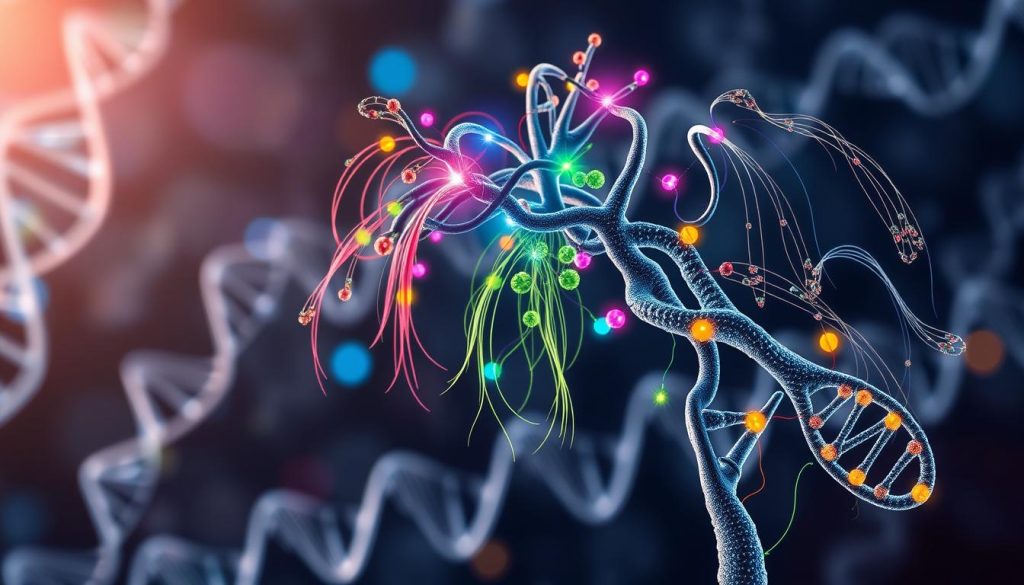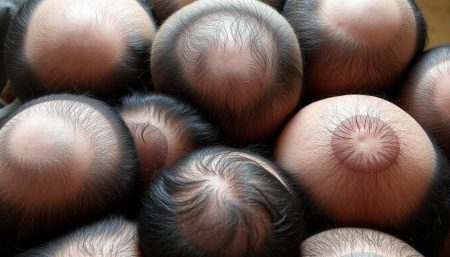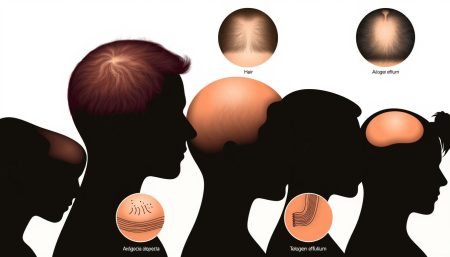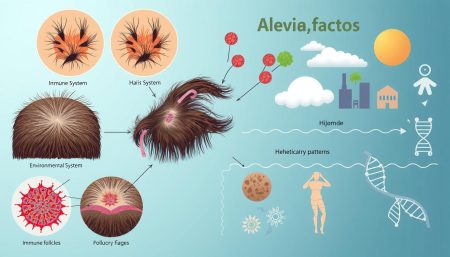Hair loss affects millions, causing emotional pain and low self-esteem. The question of is alopecia genetic? is a deep mystery. It calls for a close look at hair loss genetics and hereditary hair loss patterns. This could uncover what’s happening under our hair.
People who lose their hair search for answers. They look into science and share their personal stories. Genetics might seem like a random game, but everyone wants to find comfort and understanding.
This article will explore how genes affect hair loss. It will also offer support and knowledge. For more on genetics and alopecia, check out MedlinePlus.
Key Takeaways
- Discovering the role genetics play in alopecia and hair loss
- Understanding how different hair loss conditions manifest and connect to our DNA
- Deciphering the complex interaction of genes in hereditary hair loss patterns
- Gaining insight into how the broader scientific community views hair loss genetics
- Finding guidance for individuals grappling with the emotional impact of hair loss
Exploring the Basics of Alopecia and Hair Loss
Alopecia is more than just hair loss. It includes many conditions that affect people in different ways. We will explore the basics of alopecia, look at the types of hair loss, and explain the hair growth cycle. We’ll use insights from doctors and personal stories to understand how these conditions affect not just looks but also feelings.
What Is Alopecia?
Alopecia is a term for hair loss. It comes in many forms. Alopecia areata causes patchy hair loss, and androgenetic alopecia leads to genetic baldness. Knowing about alopecia areata genetics helps us understand its unpredictability and how it can affect anyone at any time.
Types of Hair Loss Conditions
- Androgenetic Alopecia – often genetic, affecting both men and women, characterized by a receding hairline and balding.
- Alopecia Areata – an autoimmune disorder where the immune system attacks hair follicles, causing random patches of hair loss.
- Telogen Effluvium – typically temporary hair loss triggered by stress, illness, or hormonal changes affecting the hair growth cycle.
- Anagen Effluvium – generally caused by treatments such as chemotherapy, this condition can lead to widespread hair loss.
The Hair Growth Cycle and Its Disruptions
The hair growth cycle has three phases: Anagen (growth), Catagen (transition), and Telogen (resting). Problems in this cycle, like early end of the Anagen phase or long Telogen phase, can cause hair loss. Causes include nutritional issues, stress, genetic disorders, and hormonal imbalances, showing how complex hair loss can be.
This image shows the complexity of diagnosing and treating hair loss. It highlights the need for a full approach that looks at both medical and emotional sides of alopecia.
The Role of Genetics in Hair Loss
Genetics play a big role in hair loss. It’s important to know the difference between inherited traits and other factors. This section explores how genes contribute to conditions like genetic baldness and familial alopecia.
Understanding Hereditary Hair Loss
Hereditary hair loss, or inherited alopecia, follows patterns passed down through generations. It mainly affects people because of their genes. These genes work with environmental and hormonal factors.
Studies show that genes for hair loss come from both parents. This challenges the idea that it only comes from the mother.

Androgens, especially dihydrotestosterone (DHT), play a key role in hereditary hair loss. DHT sensitivity in hair follicle cells can cause thinning and baldness. This is known as genetic baldness or androgenetic alopecia.
Is Alopecia Genetic: Fact vs. Myth
There’s a lot of debate about whether alopecia is just genetic. It’s true that genes are a big part, but saying it’s inevitable if you have a family history is too simple. Other factors like environment, lifestyle, and health also affect hair loss.
In summary, genetics are a key factor in hair loss conditions like genetic baldness and inherited alopecia. But they’re not the only factor. Knowing this can help people manage their hair loss better, leading to a more effective treatment and care approach.
The Science Behind Genetic Baldness
Exploring the scientific underpinnings of genetic baldness, like androgenic alopecia, takes us into the complex world of hair loss genetics. This condition affects millions, showing up as pattern baldness. Let’s look at the biological reasons behind this common hair loss.
Androgenic alopecia is about how genes and hormones work together. The main hormone involved is dihydrotestosterone (DHT), made from testosterone. How sensitive hair follicles are to DHT is mostly set by our genes. This can greatly affect how long hair grows.
- Inheritance of sensitivity to DHT
- Genetic transmission of receptor sites in hair follicles
- Other associated genetic factors like age of onset and progression rate
Research has found specific genes linked to pattern baldness. These genes make some people more likely to lose hair early, often in a specific pattern. This pattern is both predictable and passed down through generations.
Hair loss genetics shows that both mom’s and dad’s genes matter. This clears up the myth that baldness comes from just one side of the family. Knowing these genetic factors helps us understand hair loss better and find ways to slow it down.
In short, the mix of genes and hormones decides if you’ll get androgenic alopecia. While some might feel like they’re destined to lose hair, new genetic research brings hope for better treatments.
Identifying Patterns of Hereditary Hair Loss
Spotting hereditary hair loss early can give clues about your hair loss genetics. This part explores the usual patterns of pattern baldness in different people.
Knowing these patterns helps in treating hair loss early. Looking at your family history can show if you might get pattern baldness.
- Receding Hairline: A common sign in men, often seen in late teens.
- Thinning at the Crown: Seen in both men and women, but can be hard to spot at first.
- Diffuse Thinning: Common in women, it’s a general thinning without clear bald spots.
Tracking these patterns can show if hair loss genetics plays a role. This helps tailor treatments to fit your genetic makeup better.
| Pattern Type | Common Age of Onset | Gender Most Affected |
|---|---|---|
| Receding Hairline | Late teens – Early 20s | Men |
| Thinning at the Crown | Mid 20s – Early 30s | Both |
| Diffuse Thinning | 30s – 40s | Women |
This helps us teach and support people. We aim to give them useful info on pattern baldness and its genetic links.
Androgenetic Alopecia: A Closer Look
Androgenetic alopecia, also known as genetic baldness, is a common hair loss issue for both men and women worldwide. It causes hair to thin in a specific pattern, mainly due to genetics and hormones. Knowing about this condition helps spot early signs and get a diagnosis quickly.
Defining Androgenetic Alopecia
The term ‘androgenetic alopecia’ means it’s caused by hormones and genetics. Hair follicles become sensitive to androgens, leading to smaller follicles and shorter hair growth cycles. This results in thinner and shorter hairs over time.
Symptoms and Diagnosis
The main sign of androgenetic alopecia is hair thinning on the crown and front of the scalp. Getting a diagnosis early is key to managing it. Dermatologists use scales like the Norwood-Hamilton for men and the Ludwig for women to measure hair loss.
Androgenetic Alopecia in Men vs. Women
Men and women show different signs of androgenetic alopecia. Men often see a receding hairline and bald spots on the crown. Women keep their hairline but notice thinning hair on the scalp. Men usually start noticing in their late teens to early twenties, while women see it during menopause.
| Characteristic | Men | Women |
|---|---|---|
| Onset Age | Late teens to early 20s | Typically post-menopause |
| Pattern of Hair Loss | Receding hairline and crown balding | General thinning, especially at the crown |
| Common Scale Used for Diagnosis | Norwood-Hamilton | Ludwig |
Factors That Influence Alopecia and Genetic Predisposition
While genetic baldness is a big part of alopecia, we must also look at environmental factors and alopecia triggers. These can make hair loss better or worse. We’ll talk about how things outside and inside us can affect hair loss.
- Environmental Factors: Pollutants, UV rays, and extreme weather can harm scalp and hair. This can make alopecia worse.
- Diet and Nutrition: Not getting enough nutrients can weaken hair. Bad diets can make hair loss from genes worse.
- Stress and Hormonal Changes: Too much stress and hormonal changes can cause alopecia. This is often due to lifestyle or environment.
- Chemical Exposure: Using harsh chemicals and styling products can damage hair follicles. This can change how hair loss from genes happens.
Talking about how genetic and environmental factors affect alopecia helps people see their risks. It encourages them to make lifestyle changes or try treatments.

Understanding these connections helps manage genetic baldness better. It shows the need for a whole approach in treating alopecia. Knowing both genetic predisposition and environmental factors matter helps people take care of their hair.
Inherited Alopecia: Family History and Risk
Knowing your family’s genetic history can help you understand inherited alopecia better. By looking at family patterns, you can see how your genes might affect your hair.
Evaluating Familial Patterns of Baldness
Looking at familial alopecia means more than just seeing hair loss in your family. You need to look back at many generations. This helps figure out if hair loss is inherited or from other causes.
Assessing Your Risks: Genetics and Hair Loss
Doing a hair loss genetics risk assessment is more than just watching your family. It includes getting genetic counseling and tests. This helps you understand your risks and plan for hair loss early.
| Familial Connection | Risk Level | Recommended Actions |
|---|---|---|
| Immediate family members (parents, siblings) | High | Schedule genetic counseling, consider preemptive treatment options |
| Extended family (aunts, uncles, grandparents) | Medium | Annual hair health check-ups, monitor for early signs |
| No known family history of alopecia | Low | Maintain a healthy lifestyle, regular wellness exams |
Conclusion
We’ve looked into the mysteries of alopecia, understanding its complex nature and the emotional pain it brings. We’ve found that alopecia can indeed be genetic. This knowledge helps connect science with the personal stories of those dealing with hereditary hair loss.
This journey has shown us the importance of talking openly about alopecia. It brings light to a condition often kept hidden. Our work aims to educate more about hereditary hair loss, touching on both physical and emotional aspects.
The details of genetic hair loss vary greatly among people. By studying the science, we help those searching for answers make better choices for their health. We recognize the strength of those facing alopecia, knowing they are not alone.
Education is key, and your bravery in facing alopecia is your greatest strength. We’re dedicated to helping those affected by hair loss. Whether you’re trying to understand your own situation or support a loved one, knowledge is your guide.
For those seeking more information or a supportive community, help is available. As we wrap up our look into is alopecia genetic, we hope to offer comfort and encouragement. We want you to face your story with courage and confidence.
FAQ
Q: Is alopecia genetic?
A: Yes, some types of alopecia, like androgenetic alopecia and familial alopecia, have a genetic link. These conditions can be passed down from parents. This can affect the likelihood of hair loss.
Q: What are the different types of hair loss conditions?
A: There are many hair loss conditions. Androgenetic alopecia, or pattern baldness, is one. Alopecia areata genetics is another, caused by the immune system. Telogen effluvium is temporary hair loss due to stress or hormones.
Q: How do genetics influence hair loss?
A: Genetics play a big role in hair loss, especially in androgenetic alopecia. Genes affect how hair follicles react to hormones. This can lead to thinning and loss. Patterns of hair loss in families show the genetic link.
Q: What is androgenetic alopecia, and how is it different in men and women?
A: Androgenetic alopecia, or genetic baldness, is common in both men and women. It causes hair to thin in a specific pattern. Men often see a receding hairline and balding at the crown. Women experience overall thinning without complete baldness.
Q: Can environmental factors influence genetic predisposition to alopecia?
A: Yes, genetics are a big factor in alopecia, but environment matters too. Stress, diet, some medications, and lifestyle can affect hair loss. They can trigger or make hair loss worse in those at risk.
Q: How can I evaluate my risk of hereditary hair loss?
A: Look at your family’s hair loss history to understand your risk. Check both sides of your family for balding patterns. A doctor can also help assess your genetic risk.

















